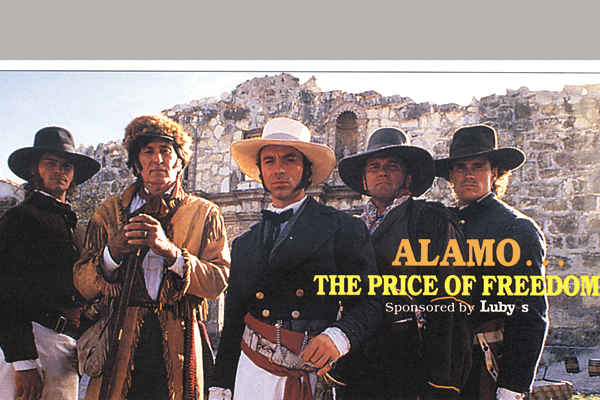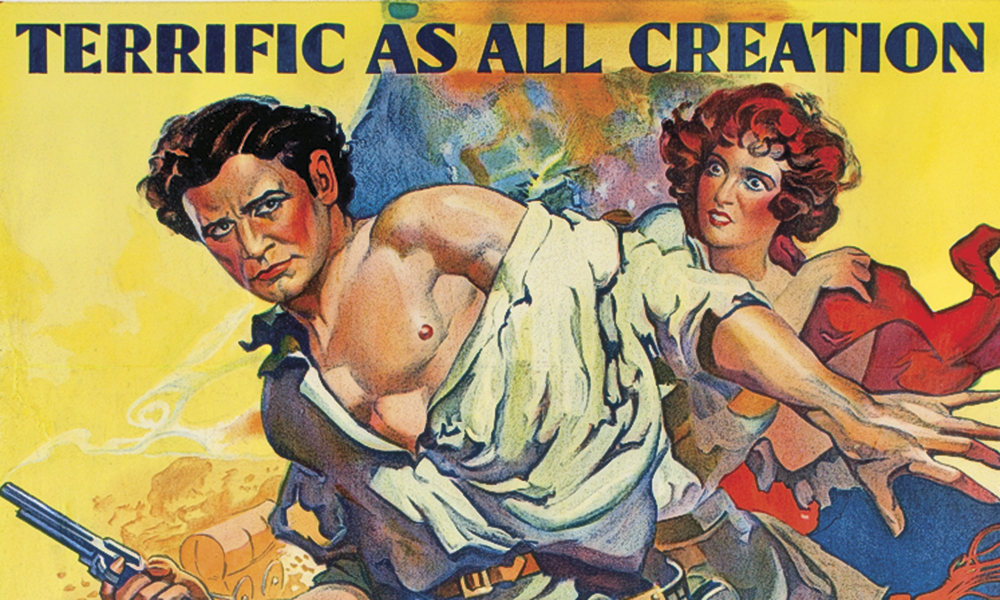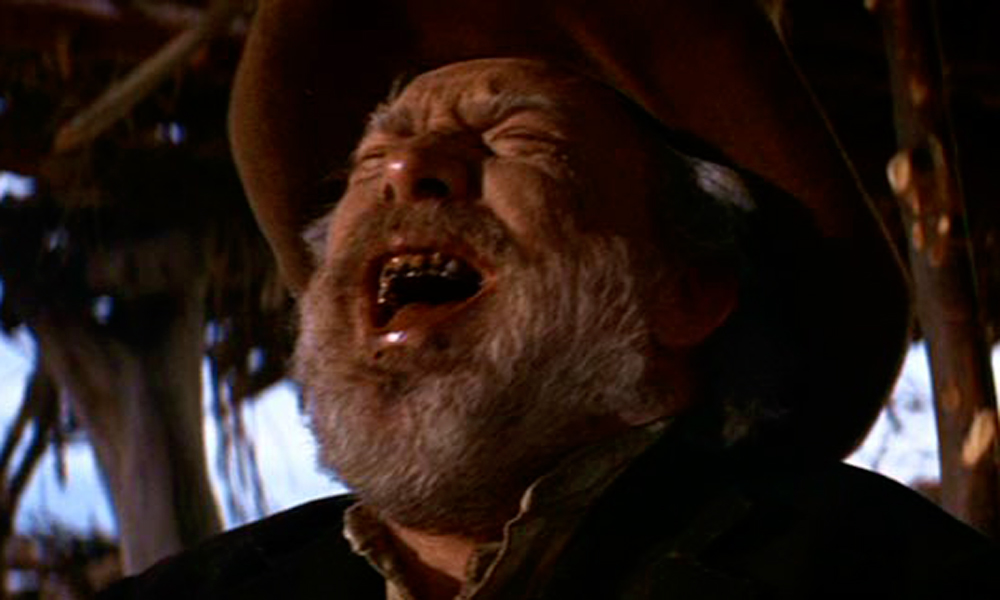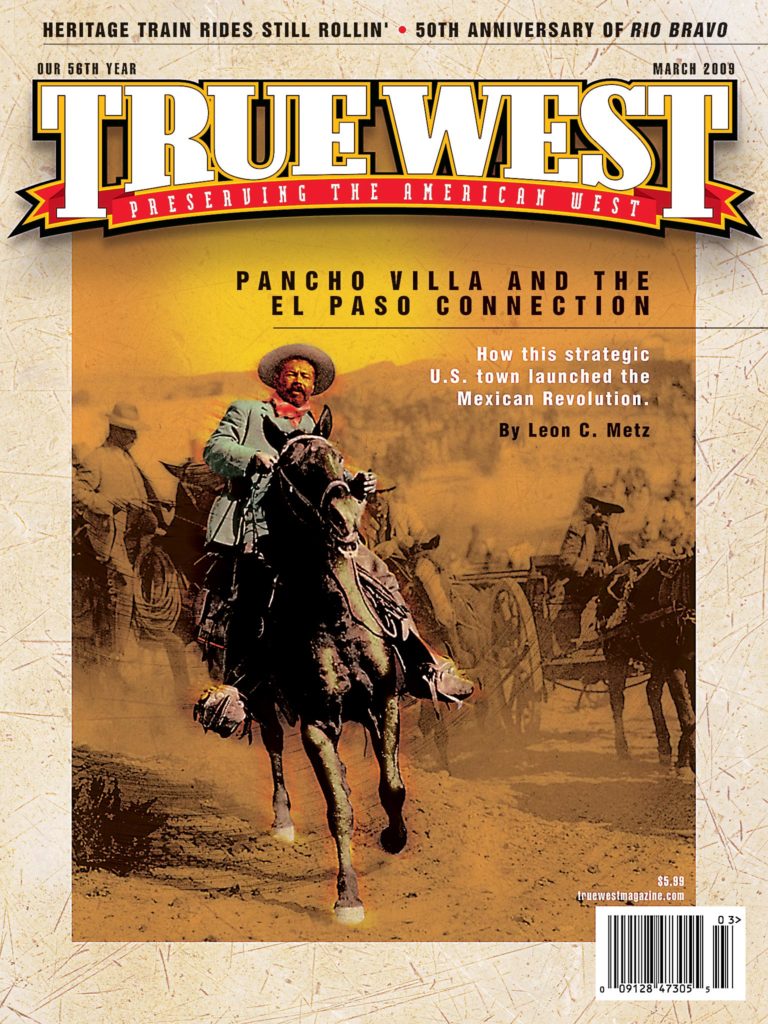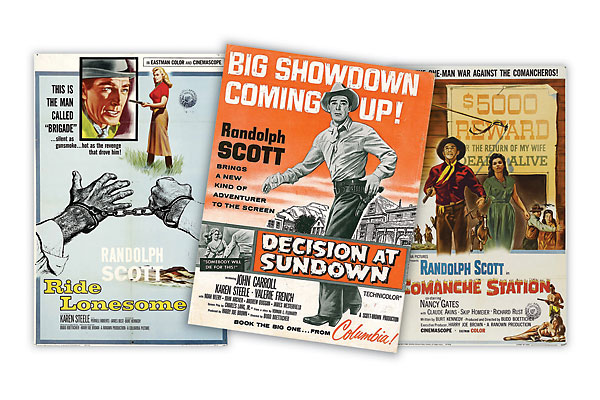
As the dust continues to settle, and the perspective changes in our grasp of what the Western was and who played a significant role in shaping it, or in some cases subverting it, certain figures rise to prominence.
With only a handful of low-budgeted films, all made within a few years in the second half of the 1950s, and all starring Randolph Scott, Oscar “Budd” Boetticher has become a giant among Western filmmakers. The problem is, Boetticher’s films are truly deceptive in their simplicity. Over-praising them can obscure their genuine virtues, because they’re great without being sensational.
These films—Seven Men From Now, The Tall T, Ride Lonesome, Decision at Sundown, Buchanan Rides Alone and Comanche Station—can be seen as a single long film with variations, and as an inextricable collaborative effort between Boetticher, Scott and, for the most part, screenwriter Burt Kennedy.
Boetticher’s first movie with Scott, Seven Men From Now, was issued in a DVD a couple of years ago. The rest were issued in a single DVD box set late last year, with first-rate remastering, abundant commentary and documentary extras. The collection made its way to the top of most reviewers’ lists as one of the best, if not the very best, package of 2008.
Among the principle commentators on the box set is filmmaker Taylor Hackford, a friend of Boetticher’s. Hackford—best known for his films Ray and An Officer and a Gentleman—offers insight on Boetticher the man, and his Westerns.
Taylor Hackford
“When I was moving from the mailroom, someone asked me if I could shoot film. I lied and said I could, and didn’t screw up too badly. I started working in both news and cultural affairs…. They said they were interested in doing pieces on people, artists, who may not be that well known, but who live in Southern California. I proposed two programs. One was about Charles Bukowski, the poet, who no one had done anything on (and it won the San Francisco Film Festival). The second one was about Budd. I did an hour special [on PBS].
I called him up and said I’d seen his films—he was living at that point on Franklin near La Brea, right in town, and he was very gracious. I went over to visit him; he lived in this high floor apartment looking over Los Angeles.
I went out to where he kept his Andalusian horses, which he had boarded out in Chatsworth. He would go out and ride all the time. We would go down to Tijuana to the bullfights; he was a great rejoneo fan, which is Portuguese bullfighting from horseback.
I talked about his Westerns and how influential I thought they were, and how film scholars thought they were. Even at that time, the French writers and critics believed he was one of the great auteurs of America, of the world actually.
We also talked a lot about his documentary on the bullfighter Aruzza, this obsession that he had, that had literally interceded and had taken away the prime years of his career.
TW: While he was making that film, most of his crew died or left. Everything fell apart.
TH: He even would up in jail. He actually found himself in a Mexican jail next to the famous Mexican muralist [David Alfaro] Siqueiros, who was the very, very radical Left-wing political guy who did brilliant murals. Budd and he disagreed politically, but as men, they were very, very attuned to each other.
You were Left of Boetticher at the time.
I was always much farther Left, Left of Budd, but it didn’t matter. The important thing for me is that Budd was the first person to say to me, “You’re a director; you will be a director.” He was just very generous and knowing him was a wonderful experience.
Budd came from a rich family in Chicago, [where] his father had a hardware factory. Budd was a football player in college, and he always was in trouble. He refused to go into the family business. He went off to Mexico and fell in love with bullfighting, and learned the processes as an apprentice. But he was somebody who plunged into life; somebody who would do it and not read about it. He was one of those people who seized life and he had a bravura about him … he was just this incredibly well-kept secret that we could know about. For example, Seven Men From Now was about impossible to see.
Those were the golden years of the auteur theory, when young movie critics were hungry to discover brilliant directors like Sam Fuller and Boetticher.
I was lucky because I didn’t go to film school. But when I started hanging with some graduate film students at USC and UCLA, those were the places that they could find these films and resurrect them…. Back in 1967-68, I was seeing Budd’s films at USC, and they had not been shown before. It was just fantastic.
Budd had a great line…. Burt Kennedy’s scripts were so wonderful and filled with double entendres and sexual tension. It was fantastic in these films. “How were you able to get away with it,” I asked him. He said, “My movies weren’t A- or even B-movies, and they never played Hollywood.”
Budd just had this amazing ability to create sexual tension. There’s this fantastic scene in Seven Men From Now, where [Scott] sleeps under the wagon with Gail Russell right above him—you know? Inches apart? Sleeping on top of each other, but not really.
A powerful romanticism and chivalry are sensed in the Boetticher/Scott films. Are those qualities innate to Boetticher, or cultivated in his love for bullfighting?
It is interesting, and I think there is a continuing theme in the Ranown Westerns of this loner whose wife was killed or abused, and him searching for retribution. There is something incredibly romantic about that, and it’s very interesting to see that appear in contemporary times. For example, Gladiator stole that idea, it seems to me, from Budd Boetticher Westerns [laughs]. The Russell Crowe character is incredibly romantic to women. And it’s romantic to women because he’s not interested in Connie Nielsen; he’s not interested in any woman. He’s in love with his wife, and he is waiting to die to join his wife in heaven.
The thing that was interesting to me about Decision at Sundown, is that they turned that one on its ear. In that piece, here he is, gone away to the Civil War and come back, and he’s, again, on this path to get even, for the death of his wife. What he doesn’t realize is, she was a tramp.
That suggests romanticism lives as an idealized value, in the emotional lives of these men. That’s why Randolph Scott can lie there with Gail Russell over his head and emote without taking any action.
Well, Budd did refer to his main characters as knights. That age-old ethos of chivalry. Remember, Randolph Scott was from Virginia. He was a gentleman. Of course, everybody talks about Randolph Scott being gay, and whether that’s true or not, I can’t say, ‘cause I wasn’t in the bedroom. But inevitably in these pieces, there are these moments of chivalry, these moments of distance from the women—.
The exception being Maureen O’Sullivan in The Tall T.
Yes, yes, exactly. But these are pretty interesting moments; the thing I thought was so great was that the sexual tension exists but is never actualized.
I think that most of the flirting in the series is between men—the way they bond or dance around each other. This suggests that their relationships with women are a much more serious event in these men’s lives.
Budd explored these fantastically wonderful, morally ambiguous characters who come up against Randolph Scott in all those films—Lee Marvin, Pernell Roberts, Craig Stevens, Richard Boone, Claude Akins—it’s really fascinating. In the instance when they are looking at Claude Akins, they’re looking hungrily at this incredibly sexy woman. At the same time, Randolph Scott is standing between them and that woman.
You also feel his sense that the women are obviously attracted to him…. So the antagonist (let’s call him) is always there to point out, “You hypocrite. You want her just like we want her. You’re just hiding behind this chivalrous thing.” But of course, Randolph Scott is willing to, and ultimately does, face off against them and kill them, to protect that.
That play between the men and the innuendo that goes on—I can’t think of a better sexual-charged scene than that scene in Seven Men From Now, with Lee Marvin sitting in that covered wagon with the wife and the husband, and Randolph Scott, and basically saying what’s going on. It’s fantastic.
Seems like the antagonists are more in touch with their desires but need to slay the father figure to take that necessary step. It’s Oedipal in some ways.
A really interesting study could be made of this, because the Western, and the West, had a male ethos, without question. There were very few women there…. The west is this wonderful place where people can go out and sow their wild oats, actually give vent to their primitive, their basest instincts as men. You’ve got a gun; you can kill, you can hunt and ultimately you end up hunting your own. It’s a very uncivilized place, whereas the urban environment of the East represented civilization.
You have these guys who have sown their wild oats, who have been “outlaws,” ‘cause each of these people when you meet them has some sort of record, some sort of bad behavior in their past. And Randolph Scott knows about it.
In Comanche Station, they know they’ve done wrong. He represents authority, and they come up against him, but they still kind of like him…. There’s an admiring quality that happens between them, which I think is common in all of Budd’s films…. The woman is always there—she’s always a fulcrum in between these men—but the interesting relationships are the relationships between the men.
The bad guy mocks Scott’s morality, but they admire it as well.
Right—you said something interesting when you mentioned Oedipal, because sons will always test themselves against the father. And they do, and they always come out losing. They lose, and in that instance, you can never beat the father.
What do you think accounted for the unique chemistry between Burt Kennedy, Scott and Boetticher?
[As a producer], Scott put together a team. Boetticher was great, but I’m a huge fan of Burt Kennedy’s scripts. There’s poetry in that language…. It’s not modern language—a frontier poetry—it really rings clear as the way people might talk at that time.
I don’t know how Kennedy and Boetticher were brought together…. The fact that they did share a sensibility, and somehow came together on the underlying themes, is a brilliant collaboration of vision.
Kennedy made a lot of Westerns, but none so great as Ride the High Country.
Well, Budd did write Two Mules For Sister Sara. He had prepared it and was wanting to do it, but Don Siegel jumped in [to direct]. It was a movie that Budd considered his own but didn’t get a chance to make. But Ride the High Country and Sister Sara are heavily Boetticher-inspired.
But I do agree. I think there are certain points you see the mating of talent—these were very, very meagerly budgeted films … and it was just a brilliant mating of two major artists who came together in this kind of disciplined situation where they had to deliver, and they did…. You make a film that quickly, the script has to be in place, you can’t go out and try to vamp on the job.
Burt Kennedy had a great gift. I know that Budd and he worked together—I’m not saying that Budd wrote the scripts, but I know that it wasn’t Burt entirely on his own…. They’d work through what they were gonna do; Burt would write it, and Budd would go right out and shoot it.
There really wasn’t any time to dally.
Thirteen days! Believe me, you don’t. That is a handsome schedule for a one-hour episode on television. When you look at the episodic Western, which was a big genre in the 1950s, Gunsmoke, The Virginian, those shows are okay. But when you think what Budd did with a 13-day shooting schedule!
What can you share with us about Scott and Boetticher’s relationship?
Budd always told me that Randolph Scott let him get on with making the film. “You got 13 days,” he’d say. “Get on with it, Budd. I’m not going to second guess about where you’re putting the camera—what you’re doing, where you’re going—just bring it in.” So the director had a lot of freedom.
The fascinating thing about Randolph Scott—Budd told me—Randolph Scott liked to play golf. He bought a home on the Wilshire Country Club in Los Angeles. But the Wilshire Country Club was restricted: no Jews, no actors [laughs].
He wanted to play the club, but of course he couldn’t, because he was an actor. And he owned a home on the course, which wouldn’t allow him to join. So he just waited for 13 or 14 or 15 years, until he retired. He went to the membership board, and he said, “I am no longer an actor.” And they let him join.
So reality is, that Randolph Scott had incredible depths of discipline and subtlety. Budd always said, “He was a Virginia gentleman.” But I still believe he was smart, and that he wielded some influence over those films. I’m sure he did.
During your friendship with Boetticher, what kind of person was he?
Let me give you one very, very personal story. There was a sequence in my program where, at the end of the show, what I wanted to do, was have the guy sit and talk about his life. Even though his is a bravura personality, it’s limited; he’s someone who’s pontificating in his own way about his career.
But Budd was an active person, a man’s man on that level. He had these horses, and he really knew rejoneo. What I did, I made a little short film, where you see Budd on horseback, dressed in his rejoneo outfit, with his flat-brimmed hat, and he rides without his hands on the reins. He completely controls his horse with his spurs. He bends over from the saddle and plants banderillas [barbed darts used during a bullfight] in the fake bull that’s there—it’s clear he’s a master horseman.
As a filmmaker, I’m shooting in 16mm, and I need to get these things right. I don’t have the best crew. I had a good cameraman, but we’re doing things over and over and over again. [Budd] is a man who is no longer a spring chicken, but he’s out there in the saddle, and his professional ego and his machismo as a man is absolutely on call. So he does it and does it and does it. I keep saying, “We didn’t quite get it.” “We’re doing something in slow motion.” “I really want to capture this.” “We’re going in tighter.” In other words, the director has to ask for things over and over, and the actor sometimes hates you for it. This was an instance in which Budd Boetticher was an actor for me, and he was hating me for putting him through all this. You can think in terms of Budd: “Listen, I did whole movies in 13 days, and you’re doing a little sequence.”?
So we finished; that was that. He got off the horse, and he went over [to me] … and he was pissed at me. He said, “Taylor, come here. I just want to show you something.” He turned around, and he pulled his pants down and he mooned me [laughs].
But that’s not the point. What it was, was that he was bleeding. He obviously had hemorrhoids, and I had put him on this horseback. He was showing me that I made his ass bleed. I was shocked. He turned around and laughed, and said, “You son of a bitch.”
But the thing that was fascinating about it was, that he had never said a word to me. He was working as an actor, for a director. That was what he expected; you never expect a complaint. He never complained. But at the end, he was damn pissed and obviously in real pain from what I was putting him through.
That is a real story about the real Budd Boetticher. He was a man with incredible pride, but he had discipline…. He had that macho ethos—the era of the 1930s and 1940s—and did what the Hemingway men did. But he knew he was a mentor to me. He also was a friend, and he treated me as an equal, even though I was 20 or 30 years his junior. “You son of a bitch. Learn to do it faster.” And he was absolutely right.
By the way, he loved the sequence. Loved it. He said, “You know what Taylor? If this wasn’t any good, I would have socked you in the eye. The reality is, it was worth it. It really is cool.” He gave me all the kind of kudos that made me feel like a million bucks. He was one of a kind.
My mentors were Budd Boetticher and Charles Bukowski—.
You’re a strange man, Taylor.
The people I admire are people who are totally uncompromising. [Although they were] very, very different individuals and [of different] temperaments, Budd Boetticher and Charles Bukowski were absolutely iconoclasts who did it their way. They didn’t give a shit. They turned their backs on success.


